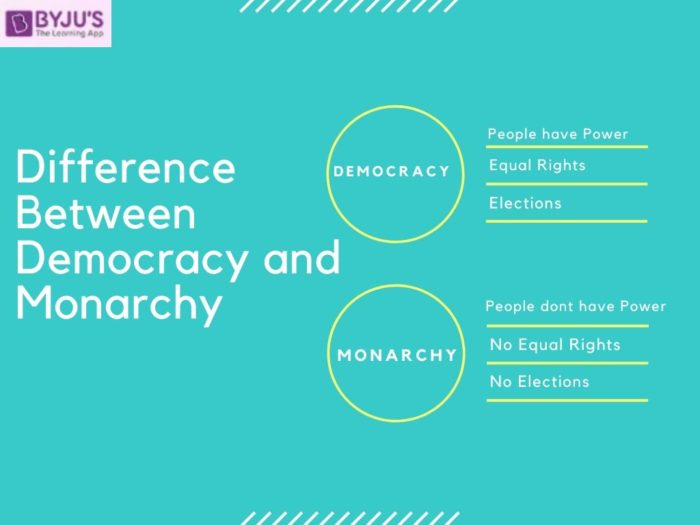Difference between Democracy and Monarchy is explained here in detail. Democracy is a form of government in which the people can choose their governing legislation. A monarchy is a form of government in which a person, the monarch, is the head of state for life or until abdication. This topic is important from the perspective of understanding the clear distinctions between Democracy vs Monarchy.
Aspirants would find this article very helpful while preparing for the IAS Exam.
Difference between Democracy and Monarchy: UPSC Notes – Download PDF Here

The major differences between Democracy and Monarchy are:
| Democracy | Monarchy |
| When a country is ruled by a Government elected by its people through elections, then it is called a Democracy | When a country is ruled by Kings and Queens, when the right to rule a country is passed through a dynasty and not through elections, it is called a monarchy. |
| The elected representatives make the laws, rules and regulations on behalf of the people for the welfare of the people. | The laws are framed by the Kings and Queens. People have no say in the formulation of laws. |
| The elected representatives are held accountable by the people of the country. Hence elections are held, and representatives lose their right to rule if they do not meet the expectations of the people | The Kings and Queens have no accountability. People do not have the power to remove Kings and Queens from power if they are dissatisfied with their administration. |
| People have the freedom to give their feedback on policies, have the option to bring about changes in the policies, and they have the right to condemn the Government. | People do not have the right to condemn the Monarchy. |
| People do not face oppression from a democratically elected Government | People may face oppression if the ruler is a tyrant. |
| People are considered equal in a democracy | In a Monarchy, people are not considered as equals. |
| The concept of Democracy originated in Greece. Athenian Democracy is often described as the first known democracy in the world. | Monarchy was prevalent in Medieval and Ancient times and still continues in a few countries. |
| Generally, the 2 types of democracies are direct democracy and a representative form of democracy. | Currently, there are different types of monarchies – absolute monarchy, semi-constitutional monarchy, constitutional monarchy, subnational monarchy, and commonwealth realms. |
| Some of the examples of democracy are India, the USA, France etc. | Currently, some of the examples of Monarchy are in Middle East countries like the United Arab Emirates (UAE) and Saudi Arabia. |
These are the main differences between Democracy and Monarchy. The differences given in the above table can help the UPSC Civil Service Exam aspirants to answer any questions easily on topics related to Democracy Vs Monarchy.
After learning about Democracy and Monarchy differences, it is better to know the details of the Presidential and Parliamentary forms of Government, Role of Civil Services in a Democracy, differences between Indian Government and US Government thoroughly. Also, check the History Syllabus for UPSC Prelims exam and, most importantly, study the Indian Polity Notes.
Visit the below-given links to learn about Role of civil services in a democracy, differences between Indian Government and US Government, Presidential and Parliamentary form of Government, Indian Polity Notes and History Syllabus for UPSC prelims exam.
- Role of Civil Services in a Democracy – Functions
- Differences between the Indian Government and the US Government
- Presidential and Parliamentary Form of Government
- Download for Free – Indian Polity Notes
- History Syllabus for UPSC Prelims – Important Topics
- Difference between Democracy and Republic
- Difference between Articles – Complete List (History, Geography, Polity and More)
Frequently Asked Questions about Democracy and Monarchy
What are the three types of monarchy?
What is a constitutional monarchy?
The above details would help candidates prepare for UPSC 2023.
Related Links
| IAS Salary | Static GK |
| Major Crops of India | Female Freedom Fighters |
| Union Minister | ESE Admit Card |
| IUCN Red List | Fundamental Rights Meaning |
Comments